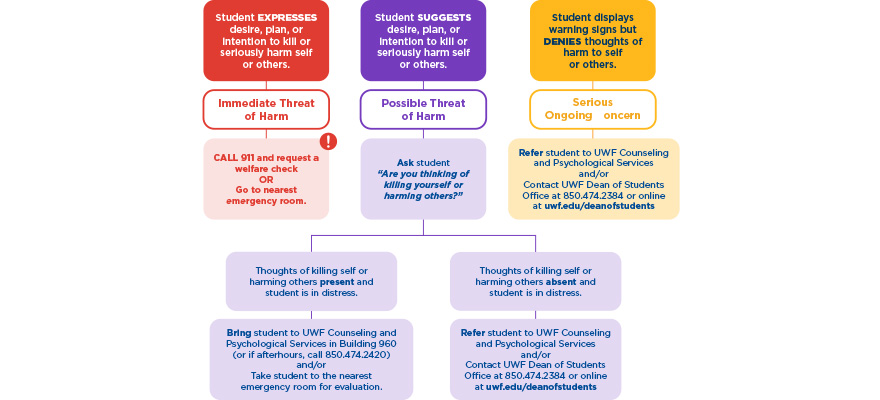911 Guide Suicide Prevention
Determine whether the situation poses an immediate threat of harm, possible threat of harm, or a serious ongoing concern.
Download the Suicide Prevention Guide
Suicide Prevention Decision Tree
Determine whether the situation poses an immediate threat of harm, possible threat of harm, or a serious ongoing concern. Follow the decision tree to see what your next possible steps may be.

Immediate Threat of Harm
An immediate threat of harm exists when a student has EXPRESSED a desire, plan or intention to kill or seriously harm self or others. This threat is magnified when a student is intoxicated or under the influence of other substances. Other serious warning signs of an immediate threat of harm may include:
- Verbal threats or physical attempts to kill or harm self or others.
- Possession of/access to a deadly weapon (e.g., firearms, knives, drug stockpiles, poisons) and an intention to use it against self or others.
- An inability to commit to personal safety or to refrain from harming others.
In the event of an immediate threat of harm, call 911 right away.
If you are not with the student, ask for the police to do a “welfare check” and share your concerns about an immediate threat of harm. Campus police will do welfare checks for students on campus and local police will do welfare check for students off campus.
Possible Threat of Harm
A possible threat of harm exists when a student has SUGGESTED a desire, plan or intention to kill or seriously harm self or others. Other serious warning signs for a possible threat of harm listed may include:
- Previous suicide attempts
- Alcohol or drug abuse
- Problems with or significant changes in mood (e.g., depression, anxiety or anger)
- Expressions of hopelessness, helplessness, or no sense of meaning in life
- Sleep problems
- Social withdrawal
- Preoccupation with death
- Feeling like a burden on others
These warning signs may be apparent at any time but may be more likely to occur when a student has experienced a major loss, including the loss of a loved one, an important relationship, a job, housing, or academic standing, among other serious losses and stressors.
If you are concerned about a possible threat of harm, ask the student, in private, “Are you thinking of killing yourself or others?” If the answer is yes or possibly yes, seek further assistance.
In the event of a possible threat of harm, seek further assistance from clinical staff of UWF Counseling and Psychological Services, campus police, and local police personnel who are trained to assess for safety.
Serious Ongoing Concerns
Serious ongoing concerns exist when a student displays any of the warning signs listed above but clearly denies any thoughts of harm to self or others, and long-term concerns about the wellbeing of the student remain. Other warning signs of a serious ongoing concern may include:
- Psychological distress or crisis
- Mental health disorder or symptoms (such as depression, anxiety, or eating disorders)
- Substance abuse or dependence
- Trauma or victimization experiences
If you are concerned about a student but unsure what to do, contact UWF Counseling and Psychological Services at 850.474.2420 and ask to consult with a counselor.
| Departments | Services Available | Contact |
|---|---|---|
| Counseling and Psychological Services |
Emergency assessments for all students, walk in basis (free of charge). Crisis counselors available by phone after hours and on weekends Faculty/Staff: Counselor consultation if in need of assistance. |
|
| Dean of Students Office | Reviews individual student concerns and responds on an individual basis for students in need of assistance. |
850.474.2384 |
| Campus Police | Perform safety assessment anywhere on and off campus. | 850.474.2415 |
| Local Police | Perform safety assessment anywhere on and off campus. | 911 |


